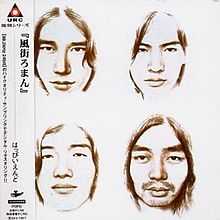Kazemachi Roman
| Kazemachi Roman | ||||
|---|---|---|---|---|
 | ||||
| Studio album by Happy End | ||||
| Released | November 20, 1971 | |||
| Recorded |
May 11, 1971 – September 12, 1971 Mori Studio and King Studio in Tokyo, Japan | |||
| Genre | Folk rock | |||
| Length | 37:14 | |||
| Label | URC Records | |||
| Producer | Happy End | |||
| Happy End chronology | ||||
| ||||
Kazemachi Roman (風街ろまん Kazemachi Roman, literally "Wind City Romance"), is the second album by Japanese folk rock band Happy End, released on URC Records in 1971. In this concept album, Happy End attempted to paint a musical picture of Tokyo before the 1964 Summer Olympics, through which sweeping changes transformed the city forever.
Bannai Tarao (多羅尾伴内 Tarao Bannai), a fictional detective, who has appeared in many Japanese crime thrillers, is credited on several of the album's songs. In addition, the singer on "Haikara Hakuchi", even opens the song by saying, in English, "Hi, this is Bannai Tarao. Haikara (lit. "High-collar" or "Western fashion") is... Beautiful."
In September 2007, Rolling Stone Japan ranked Kazemachi Roman No.1 on its list of the "100 Greatest Japanese Rock Albums of All Time".[1]
Track listing
Side one: "Wind"
- "Dakishimetai" (抱きしめたい "I Want to Hold You") - 3:35
- Lyrics: Takashi Matsumoto, Music: Eiichi Ohtaki, Produced by Eiichi Ohtaki
- "Sorairo no Crayon" (空色のくれよん "Sky Blue Crayon") - 4:09
- Lyrics: Takashi Matsumoto, Music: Eiichi Ohtaki, Produced by Eiichi Ohtaki
- "Kaze wo Atsumete" (風をあつめて "Gather the Wind") - 4:06
- Lyrics: Takashi Matsumoto, Music: Haruomi Hosono, Produced by Haruomi Hosono
- This song was featured in the 2003 film Lost in Translation as well as on its soundtrack.
- "Kurayamizaka Musasabi Henge" (暗闇坂むささび変化 "Ghosts of Flying Squirrels at Kuriyamizaka") - 1:57
- Lyrics: Takashi Matsumoto, Music: Haruomi Hosono, Produced by Haruomi Hosono
- Originally this song was called "Momonga" ("Flying Squirrel"). Kurayamizaka is located in the Azabu district of Tokyo, and Matsumoto clearly shows his nostalgia for this area of the city in this song.
- "Haikara Hakuchi" (はいからはくち "Westernized Idiot") - 3:37
- Lyrics: Takashi Matsumoto, Music: Eiichi Ohtaki, Produced by Eiichi Ohtaki
- This was a B-side to Happy End's single "Jyunigatsu no Ame no hi" ("A Rainy Day in December") off their first album. This LP's version is different, however.
- "Haikara Beautiful" (はいからびゅーちふる "Westernized, Beautiful") - 0:33
- Lyrics, music, and production: Tarao Bannai (fictional Japanese detective)
Side two: "City"
- "Natsu Nandesu" (夏なんです "'Tis the Summer") - 3:16
- Lyrics: Takashi Matsumoto, Music: Haruomi Hosono, Produced by Haruomi Hosono
- This was the B-Side on the "Hanaichimonme" single.
- "Hana Ichi Monme" (花いちもんめ "Hana Ichi Monme" (a children's game)) - 3:56
- Lyrics: Takashi Matsumoto, Music: Shigeru Suzuki Production: Shigeru Suzuki and Tatsuo Rin
- Matsumoto thought this was a representative song of Happy End, and it was released as a single.
- "Ashita Tenki ni Naare" (あしたてんきになあれ "We hope that tomorrow is clear") - 2:13
- Lyrics: Takashi Matsumoto, Music: Haruomi Hosono, Produced by Haruomi Hosono and Shigeru Suzuki
- "Taifuu" (颱風 "Typhoon") - 6:30
- Lyrics: Eiichi Ohtaki, Music: Eiichi Ohtaki, Produced by Tarao Bannai (fictional Japanese detective)
- "Haru Ranman" (春らんまん "Spring, in full bloom") - 2:55
- Lyrics: Takashi Matsumoto, Music: Eiichi Ohtaki, Produced by Eiichi Ohtaki
- "Aiueo" (愛餓を "Love-Hunger", or "ABC" (word play)) - 0:33
- Lyrics: Takashi Matsumoto, Music: Eiichi Ohtaki, Produced by Tarao Bannai (fictional Japanese detective)
2004 Bonus tracks
- "Haikara Hakuchi" (はいからはくち) (Introduction~Narration (Take Erushii))
- "Haikara Hakuchi" (はいからはくち) (Narration (Take 1 & 2))
- "Haikara Hakuchi" (はいからはくち) (City Version)
- "Haikara Hakuchi" (はいからはくち) (Single Version)
- "Ashita Tenki ni Naare" (あしたてんきになあれ) (Rehearsal Take/Rhythm Tracks)
- "Natsu Nandesu" (夏なんです) (Rehearsal Take)
- "Aiueo" (あいうえお)
- Although written differently than track 12, the romanization is the same.
Personnel
- Haruomi Hosono (細野晴臣) - bass, vocals, keyboards
- Takashi Matsumoto (松本隆) - drums
- Eiichi Ohtaki (大瀧詠一) - guitar, vocals
- Shigeru Suzuki (鈴木茂) - guitar
External links
Notes
- ↑ "Finally! "The 100 Greatest Japanese Rock Albums of All Time" Listed". exclaim.ca. Retrieved 2012-08-18.